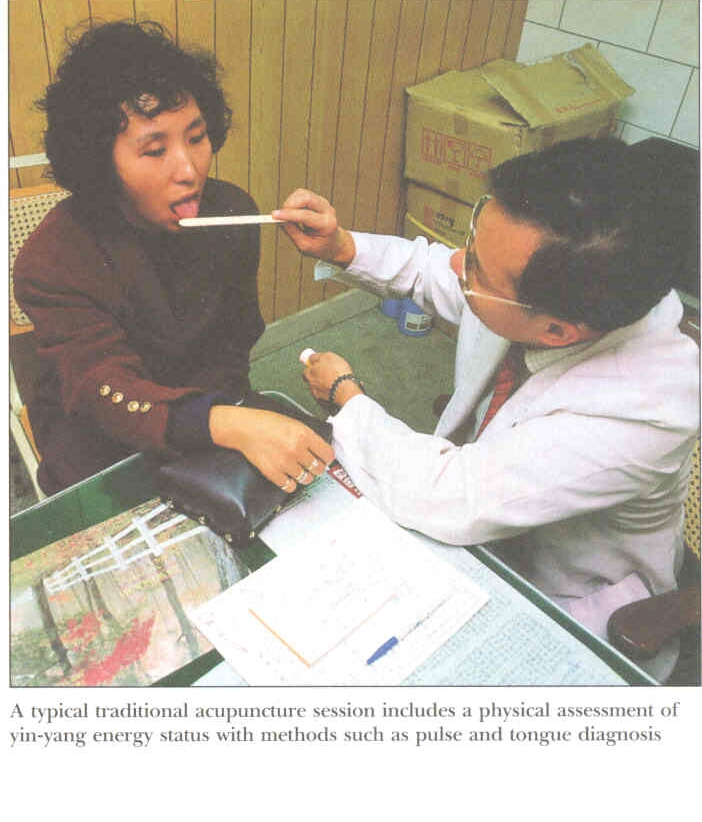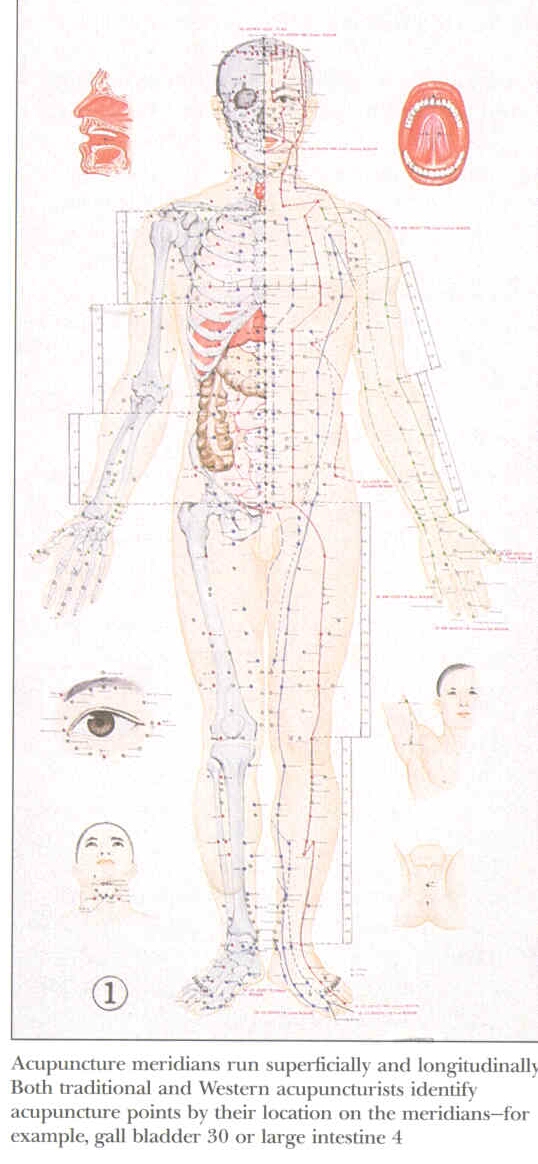ACUPUNCTURE AND SMOKING BY JESSICA YANG
Withdrawal treatment of cigarette smokers is a task of the utmost urgency in view of the consequences for national health programs and legislative policies of the high morbidity and mortality rates caused by smoking.› For those who find it hard to quit smoking žat willÓ, and do not want to receive žadditional assistanceÓ from nicotine products such as gums and patches, the needle or acupuncture offers a new and maybe more effective way to stop the cravings.›
Millions of Americans have been helped by acupuncture in relieving their pain or headache.› According to National Institutes of Health (NIH), Americans made over 5 million visits to acupuncturists and spent about $695 on acupuncture practice in 1998.› And NIH has recently endorsed it as an alternative or complement to standard medical practice.› There is also a celebrity endorsement in addition to NIHŪs official endorsement.› Cardinals first baseman, Mark McGwire, who has been doing acupuncture for his back for over 3 years, was quoted saying, žsometimes Eastern medicine is better than Western medicine. I really believe in acupuncture. It can relieve things very quickly.Ó
Acupuncture is a form of
medical therapy that involves inserting thin, solid needles into selective
sites on the surface of the body. žIn general, acupuncture is based on the
theory that energy flows though the human body on specific pathways connected
to specific organsÓ, said Duncan, who studied the theory and practice at the
Traditional Acupuncture Institute in Columbia. Acupuncture points have been
located on the ear that, when pierced by tiny needles, produce immediate calm
and reduce the cravings and symptoms of withdrawal from alcohol, nicotine,
opiate drugs and cocaine. The needles somehow stimulate the nervous system
and tissues that control involuntary yet fundamental bodily functions, such
as circulation and tissue repair. It operates "on the border of what
is tangible and intangible," Duncan said. "It's all about balance
and harmony." Many of the conventional health professionals who practice
acupuncture have dispensed with such concepts. Acupuncture points are seen
to correspond to physiological and anatomical features such as peripheral
nerve junctions, and diagnosis is made in purely conventional terms. 
Traditional
acupuncturists supplement a detailed, multi-system case history with observations
that are said to give information about the patient's state of health. These
include examination of the shape, coating, and color of the tongue; the color
of the face; and the strength, rhythm, and quality of the pulse. Both Western
and traditional practitioners may palpate to identify points at which pressure
causes tenderness or pain ůžthe trigger points,Ó an important concept used
by acupuncturists. During a typical acupuncture session, between 4 and 10
points are needled. The needles are usually left in place for 10-30 minutes,
although some practitioners needle for only a few seconds or minutes.› Needles
may be stimulated by manual twirling or a small electrical current. Lasers
are sometimes used to stimulate acupuncture points instead of needles. Some
practitioners suggest the ancient Chinese practice of acupuncture stimulates
the release of endorphins and other chemicals in the body that regulate mood,
cravings and willpower.
To date, there is no definite evidence to support the effectiveness of acupuncture helping smokers quitting. In fact, a few studies have claimed that acupuncture has no significant positive effect on smoking cessation.› In a controlled trial of acupuncture for addiction treatment, the 8 studies of smoking cessation used a variety of acupuncture techniques and control methods.› Although some of these studies showed short-term benefits in the acupuncture groups, the effects were not sustained.› British Medical Journal stated in its publication that it is not clear whether acupuncture has clinically proven benefits in smoking cessation. It further stated that systematic reviews and randomized controlled trials suggest that acupuncture is probably not of benefit for stopping smoking.
Despite of BMJ and other influential Medical publications not recommending acupuncture as an effective way to stop smoking, many people try it anyway.› In fact, many people had acupuncture said it worked, their cravings for nicotine have disappeared.› And recently, new reports of effective evidence from studies of acupuncture assisting smoking cessation have been published in various žnon-authoritativeÓ medical publications.›
Exactly how acupuncture works to combat nicotine addiction, in many ways, is still a mystery, but it is becoming more popular because of clinical evidence and patient testimonies that show it to be effective (at least for some people).› Evette Porter gave a detailed description of her acupuncture experience in the Jun 16, 1998 edition of The Village Voice.›
After our initial consultation about my medical history, I lay on a massage table. For addiction, the focus is on auricular (ear) acupuncture. Bloom inserted several sterilized needles, three to five inches in length-around my ears, in the visible portion of the inner ear and behind the lobes. Others were inserted in my feet, ankles, wrists, and around the temple area. Soothing music (a Charlie Mingus tune) played in the background. I felt an overwhelming calm and tranquility-an out-of-body sensation.› The first application, usually the longest, lasts from 15 minutes to an hour; mine took 40 minutes. After a while, Bloom returned and removed the needles. Only a slight redness from the pricks remained.› I walked out feeling a little high and went shopping. For a few days I had no thoughts of smoking; a couple of weeks later, when I craved a cigarette, I went back for a follow-up session. I've been smoke-free for almost a year now-but I've gained 20 pounds.
Note that Evette Porter is a 20-year addict.›› She has tried nicotine patch and Nicorette gum and found both unsuccessful in helping her quitting smoking.›
Also reported by Rick Chillot in Nov. 1998 issue of Prevention that a study from Norway revealed that a combination of acupuncture techniques-electrified needles in the body, regular needles in the ears, and acupressure to the ears-holds real hope for those trying to quit smoking.› At the end of the three week study, 31 % of the people in the group receiving the precisely aimed treatments had quit smoking completely; none of the people in a similar group-- who got "needled" the same way but in (deliberately) wrong spots-was able to quit.
May 28, 2000 Denver Post reported: Dr. Andy Gow and Dr. Amy Reeves, a husband and wife who practice at Abarr Lake Chiropractic and Acupuncture Clinic, conducted a six-week study recently on 100 tobacco users to determine if acupuncture can help people quit. During the study in February and March, 38 percent of the participants successfully quit smoking, a higher success rate than the 18 percent who quit using a nicotine patch or gum, Gow said. Of the remaining participants, 52 percent cut their smoking in half; 8 percent noticed some effect - they smoked less, had reduced cravings or found it distasteful to smoke; and 2 percent saw no difference. Gow said the acupuncture treatments reduce cravings without using nicotine and people who quit with the patch or gum must wean themselves from nicotine. žacupuncture is so much more natural.Ó
Addictions are difficult
to treat by any single method; a multifaceted approach may yield the best
results. Given the positive outcomes of some of the clinical trials, the NIH
panel suggested including acupuncture as part of a broader, comprehensive
treatment program. 
We can conclude that Acupuncture is a viable alternative for someone seeking a way to quit smoking addiction. It can be especially helpful and hopeful for people who canŪt tolerate the side effects of medication or anyone who prefers a non-pharmacological approach.›› According to British Medical Journal,› acupuncture, though significant evidence supporting its effectiveness,› is a relatively safe form of treatment with a low incidence of serious adverse events. An extensive worldwide literature search done by BMJ only identified only 193 adverse events (including relatively minor events such as bruising and dizziness) over 15 years. The more serious events were usually related to poor practice-for example, cases of hepatitis B infection typically involved bad hygiene and unregistered practitioners. So what's the bottom line? If conventional medical treatment or patches haven't worked for you or if you want something more, acupuncture does offer a promising alternative with increasing evidence to back it up.› Still, we have to understand that acupuncture isn't going to QUIT for smokers. It will help with the cravings, but smokers have to have the mindset that they WANT to quit.
›
References:
žAlternative Health Services in the› U.S., 1998.Ó Alternative Medicine.› National Center for Complementary and› Alternative Medicine, National Institutes of Health (NIH)
CHAPMAN, C. RICHARD. "Acupuncture." Grolier Multimedia Encyclopedia Online. Grolier Interactive Inc. Danbury, CT. < http://gme.grolier.com/cgi-bin/gme_bp?artbaseid=0002150-0>. January 2, 2000.
CHILLOT,› RICK. žAcupuncture helps smokers quitÓ Prevention. Emmaus. Nov 1998
HUMMEL, RICK. žMcgwire Will Receive Acupuncture For Back.Ó› St. Louis Post ā Dispatch. St. Louis, Mo. Aug 12, 1999. D7.
JORDAN, FELICIA. žChiropractors stick it to nicotine cravingsÓ›› Denver Post.› Denver, Colorado.› May 28, 2000. B-06.
LAWRENCE, MELISSA. žMy big break: Rising from the ashes Anne Penman discovered a laser therapy
way to stop smoking after her husband suffered a heart attack. She now runs 14 centres. Melissa Lawrence talked to herÓ The Guardian. Manchester. Jul 10, 1999
LEWIS, LAURIE. žAcupuncture:› Another therapeutic choice?Ó Patient Care. Oradell. Jun 15, 1999. 149-176
PORTER, EVETTE.› žSmoke & needlesÓ The Village Voice. New York Jun 16, 1998› Page 83
VICKERS, ANDREW. žABC of complementary medicine:› Acupuncture.Ó› British Medical Journal. London. Oct 9, 1999. 973-976.